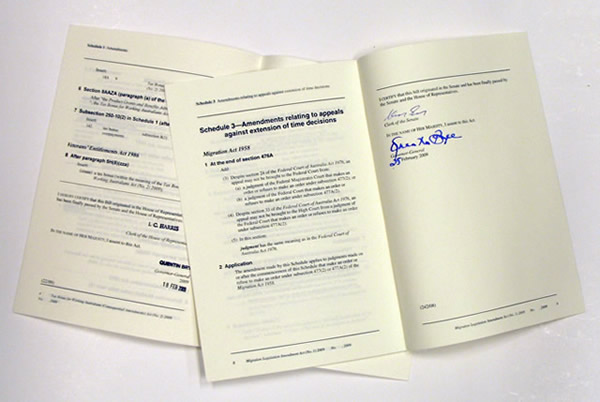139 Assent to bill
-
A copy of an Act resulting from a bill which originated in the Senate, bearing the Governor-General’s signature and showing the date of assent, shall be retained by the Clerk.
-
There shall be laid on the table, on or before 31 August each year, details of all provisions of Acts which come into effect on proclamation and which have not been proclaimed, together with a statement of reasons for their non-proclamation and a timetable for their operation.
Amendment history
Adopted: 21 November 1989, J.2219, as part of the revised standing orders (to take effect on the first sitting day of 1990) (formerly part of a longer joint standing order applicable to both Houses, relating to the dating and numbering of Acts; an original joint standing order from 1903, it was replaced by another version on 2 December 1965, J.427, adding the requirement for the Clerk to retain a signed copy)
Amended:
- 13 February 1997, J.1447 (to take effect 24 February 1997) (title changed from “Signed copy of bill” and paragraph (2) added, formerly an order of continuing effect agreed to 29 November 1988, J.1205)
- 22 November 1999, J.2008–09 (paragraph (2) amended to require an annual rather than a biannual return)
Commentary
In practice, several assent copies of bills are prepared and a number (which has varied over the years) sent to Government House for signature. These are used for various purposes including one original signed copy for permanent retention in the National Archives of Australia and several copies to be used by the Office of Parliamentary Counsel for administrative and records purposes. Another signed original copy is returned to the originating House for permanent retention, in the Senate’s case for compliance with the first paragraph of this standing order. Several of the copies are “stamp-signed”; that is, they do not bear original signatures but stamped names of the Governor-General and the Clerk of the originating House. One of these goes to the other House for records purposes.
Paragraph (2) had its origin in concerns that arose in the late 1980s that laws which had been passed by the Parliament were being prevented from coming into effect by the executive government declining to issue the necessary proclamations. The will of the parliament was thus vulnerable to subversion by the executive. This drew attention to the shortcomings of drafting practices that provided for laws or parts of laws to come into effect on dates to be proclaimed by the Governor-General on the advice of the government. While many laws are drafted to come into effect on specified dates and laws which are silent on this point are covered by s.5 of the Acts Interpretation Act 1901,[1] a proportion of laws were drafted to commence on proclamation, sometimes for sound administrative reasons.

The Governor-Generals assent to bills in accordance with the Constitution
The issue was raised by Senate officers in various articles[2] and the Senate agreed to an order in September 1988, initiated by Senator Macklin (AD, Qld), for the production of a list of unproclaimed laws and provisions of laws, together with reasons for their non-proclamation and a timetable for their operation. The list was produced and debated in November that year. Included among the reasons given for the non-proclamation of particular provisions was “continued Ministerial and bureaucratic opposition on enactment”! The list included provisions which had been identified as extremely urgent at the time of enactment – such as the 1979 Customs Act amendments to permit body cavity searches, urgently required in the fight against organised crime and international drug trafficking – but which remained unproclaimed nearly 10 years later without explanation. A few days later a further resolution was agreed to requiring the list and explanation to be tabled twice a year.[3] One rationale for the requirement was that the Senate had long enjoyed information about the proclamation of legislation and it was therefore entitled to information about laws that had not been proclaimed.
This resolution was incorporated into the standing orders in 1997 as part of the consolidation recommended by the Procedure Committee.[4] As the order continued to operate over the years, the size of the list diminished and a drafting instruction issued by the Office of Parliamentary Counsel in 1989 with the support of the Scrutiny of Bills Committee replaced the old open-ended commencement provisions with a default provision allowing automatic commencement (or repeal) after 6 or 12 months if a proclamation had not been issued in the meantime. The Scrutiny of Bills Committee had consistently drawn the Senate’s attention to open-ended commencement provisions on the basis that they involved an inappropriate delegation of legislative power to the executive. Against this background, the Senate agreed to a government proposal in 1999 to reduce the reporting requirement to an annual requirement.[5]